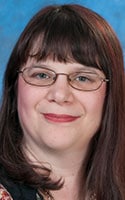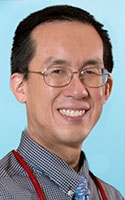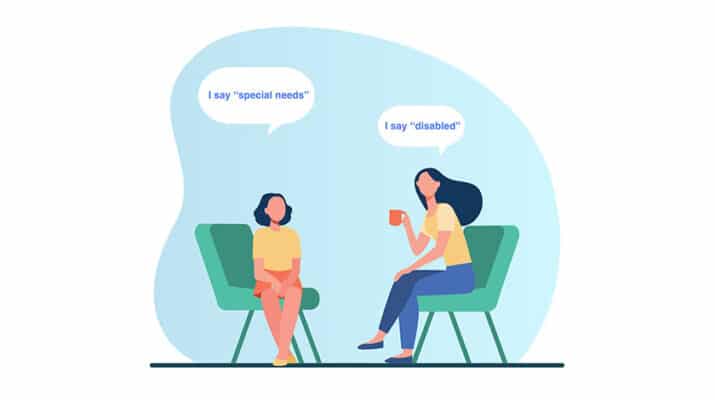Experts: avoiding the term ‘disabled’ only leads to stigmatization
By Deborah Jeanne Sergeant

Probably arising from the push for additional education supports for persons with disabilities, the term “special needs” has been used for years but is beginning to fall out of favor with some groups.
“Most experts and advocates vehemently oppose the term ‘special needs’ and believe we need to eliminate it from our vernacular,” David Oliver said in a June 11, article in USA Today. “Furthermore, they say avoiding the term ‘disabled’ only leads to stigmatization.”
The term “special needs” is not a legal or medical term and was likely coined to describe the support needed beyond what people who are non-disabled need. According to the Merriam-Webster dictionary, the first known use was in 1899. But these days, it is falling out of favor.
Like many other similar organizations, the New York State Office for People With Developmental Disabilities in Albany, uses “person-first language” for the people it supports.
“We agree that words or negative references can influence how the general public view people with disabilities and can also be damaging to a person’s mental health and wellbeing,” said Jennifer O’Sullivan, director of communications.
“We’re going away from ‘person with special needs’ and ‘handicapped’ but use ‘sir’ and ‘ma’am,’” said Brandon Jerla, director of staff development and learning at Empower in Niagara Falls. Empower operates 10 certified group homes throughout Niagara County supporting people with developmental disabilities and provides day services, employment services, and day school special education beginning at age 4.
The organization also uses “children or adult with special needs” or when speaking specifically, “she has autism” or “he has Down syndrome”’ or “she has a learning disability.”
Previously, it was “my people” which the organization has deemed as degrading since each person is an individual. The organization is also moving away from “consumer” and “client,” which connotate an impersonal transaction.
“We teach employees to say, ‘people I support,’” Jerla said. “A lot of times when someone isn’t used to being around someone with developmental disabilities or intellectual disabilities, they’re not sure what to say. We never want to label someone based on their disability, like ‘non-verbal.’”
Yet at times when mentioning the challenge or diagnosis is necessary, using straightforward and person-first language is the best policy.
Jerla believes that keeping the members of the organization on the same page can indicate due respect and that it can “trickle out to the community. It can start to break down the stigma.”

Physician Dennis Z. Kuo, chief of the division of general pediatrics, UBMD Pediatrics and University at Buffalo and associate professor, University at Buffalo, said that “special needs” may be considered potentially stigmatizing based up on the context.
“Grammatically, the reason the medical world has used ‘special needs’ without diagnosis,” Kuo said. “It’s to say that certain children need additional services. We as a field really try to move away from basing services and support on diagnosis because you can have ongoing needs without a diagnosis. ‘Special needs’ is helpful in that regard.”
It can also be helpful as a shorthand for a group of people with varying types of and levels of needs. But “special needs” may also sound demanding—as if the needs themselves are above what other people need and not the means to obtaining what they need.
Kuo said the term “disability” is based upon function and society—that someone cannot do without accommodation something essential for daily living most people can do. For example, those who cannot run a four-minute mile aren’t “disabled,” as only elite runners can perform at this level. Also, running that fast is not an essential skill for daily living or that contributes to basic quality of life. An “accommodation” like reading glasses is not related to a disability both because of the ubiquitous use of reading glasses and the relative ease of overcoming the “disability.”
“It’s also how we construct the world around them,” Kuo said. “That begins to clarify stigmatizing. People who have disabilities are people like anyone else. We look at typical functioning in the pediatric world. What would be considered typical development. It’s relative to someone who’s typical can broadly do.”
It is also important to recognize what distinguishes a person from another. While that may include a disability in some contexts—statistics and research, for example–that should not be the main characteristic. That is why person-first language is important.
“People Inc. and other groups that provide services for people with developmental disabilities put the person first,” said Nicole Forgione, assistant director of marketing and communications for People, Inc. in Buffalo. “‘Handicapped’ has been seen as a negative label. Ideally, you wouldn’t want to say ‘handicapped’ or ‘disabled’ but ‘a person with a disability.’”
While she acknowledged that “special needs” can provide a simple, vague shorthand for a variety of disabilities, it is generally better to state the specific disability when doing so is necessary.
Forgione views euphemisms like “differently abled” as condescending. The term may sound upbeat; however, it may also lend a connotation that the individual possesses savant qualities not present. “Differently abled” may also gloss over the real struggles facing a person challenged by activities of daily living—a person who may need some accommodation or help to get through the day and to live as desired.
“It’s important to focus on a person’s abilities rather than weaknesses if they need help to improve their quality of life,” Forgione said. “Everyone has strengths or weaknesses whether they have a disability or not.”
Some people embracing their disability as a part of who they are and how their experiences have helped shaped their character simply prefer “disabled,” “autistic” or another term, sometimes used before their name.
“More and more people are thinking along those terms,” Forgione said. “They are very proud of who they are.”
Over her 20 years of working for People, Inc., she has seen the verbiage move from “client” to “consumer” to “individual,” or “individual with developmental disabilities.”
When speaking with or about a specific person, Forgione encourages asking if one is not sure what word to use.
“That can be uncomfortable for some but the person on the other hand may be more willing to share and appreciative of that,” she said. “People just want to feel included in their lives weather at school or work or socially. Inclusion is so important and what it means to others is important. It can be different for one person to the next.”

